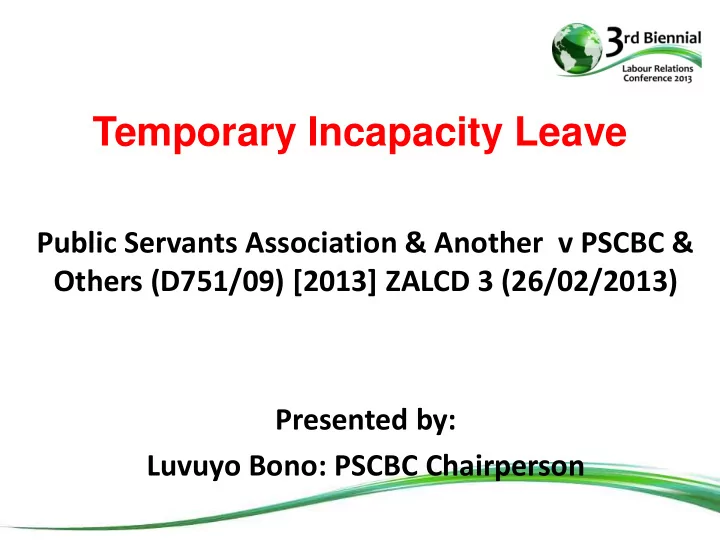

Temporary Incapacity Leave Public Servants Association & Another v PSCBC & Others (D751/09) [2013] ZALCD 3 (26/02/2013) Presented by: Luvuyo Bono: PSCBC Chairperson
Contents What are the implications of the State delaying to give a response within 30 days on an application for TIL; If the state gives a response to the application after 30 days, can it recover its money for the period the employee was on TIL whilst waiting for the outcome of the application The status of Employer policies which deal with the Implementation of a Collective Agreement
Facts • Ms Gouvea applied for TIL. The DRDLR approved her sick leave for 7 November 2007 to 3 December 2007 with no hassle. • Approval of the leave period of 4 December 2007 to 30 June 2008 was granted only after Ms Gouvea had successfully lodged a grievance. • The DRDLR declined to approve her leave of absence for the rest of the period from 1 July 2008 to February 2009, notwithstanding Ms Gouvea’s application for incapacity. • She then lodged a grievance.
Facts • On 24 June 2008 Ms Gouvea received a letter from the DRDLR instructing her to report for duty not later than 1/07/2008, failing which her absence from duty was be treated as leave without pay. • She was also informed that her grievance would be referred to a state agency called Soma, invested with powers to make final recommendation on incapacity. • A report was issued by the Health Risk Manager declining the application for long periodical temporary incapacity leave for 4 December 2007 to 30 June 2008. PSA obo Gouvea referred the matter to the PSCBC, for conciliation and Arbitration.
Arbitration Proceedings • The issue before the Arbitration was whether in terms of Res 7 of 2000 Ms Gouvea was entitled to the temporary incapacity leave (TIL) and further whether the DRDLR could recover Ms Gouvea’s salary for the period up to June 2008 and not to authorise payment for July 2008 to February 2009. • The Arbitrator found that Ms Gouvea was not entitled to be granted temporary incapacity leave longer than 30 working days. The DRDLR was found to be entitled to recover from her the salary paid to her for the period December 2007 to June 2008 and that she was not entitled to further remuneration for the period July 2008 to Feb 2009.
Labour Court Proceedings • PSA referred the Award to the LC for Review • In its judgement the Court dealt with the two leave periods that a greivance was lodged for. ( 4/12/07 – 30/06/08 & 1/07/08 – Feb 2009) • Par 19: Once all investigations pertaining to the temporary disability leave are finalised and a decision is taken by the third respondent and communicated to Ms Gouvea, then and only then is the moment reached when she could be called back to work, and should the decision go against her.
Labour Court Proceedings • Par 20: The consequence of a retrospective effect is that it amounts to an unreasonable and arbitrary exercise of a discretion with unfair consequences to an employee. • Nowhere in clause 7.5 of Resolution 7 of 2000, is there a suggestion that the employer may not grant further sick leave after the lapse a 30 day period. On the contrary, as investigations shall be in accordance with item 10 (1) of Schedule 8 of the Act, a further sick leave period may be granted to the employee.
Labour Court Proceedings • Par 18: The Court said the Employer is at liberty to legitimately allow itself to be guided by relevant material outside of the collective agreement as long as this is done without infringing the rules of interpretation
Implications of the Judgement • Where the State exceeds 30 days in investigating and giving an employee a response on his/her application, it cannot penalize the employee. • Only from when the employee has been told to come back to work, can he/she be penalized. • In reality where an employee applies for temporary incapacity leave (ito Res 7 of 2000) and the employer through Health Risk Manager takes more than 30 days to give a decision, the period outside of the 30 days is at the peril of the employer and the employee will be paid until such time that he/she is told that his/her application is rejected and therefore he/she must return to work
Way Forward Amend Resolution 7 of 2000, to allow for a longer period to respond; Tighten the contract between the State and the Health Risk Service Provider to possibly provide for penalty for delayed outcome
Recommend
More recommend